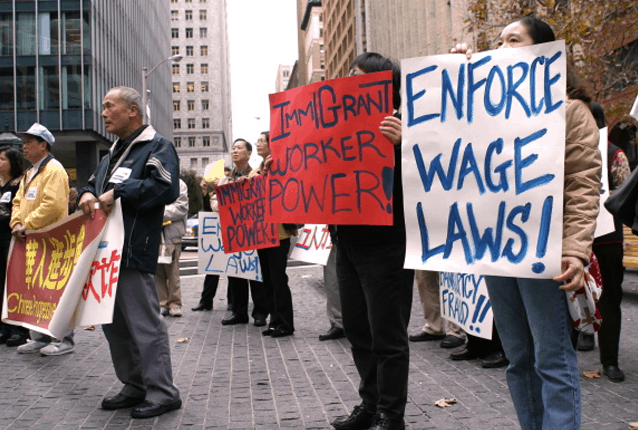
Minnie Che is a student at Harvard Law School.
In an online exchange sponsored by American Compass, Ben and Sharon write about how the decline of the labor movement has contributed to stark economic and political inequality in America, and how fixing labor law is one way to address this inequality. The piece focuses on labor law’s inequitable treatment of immigrants, workers of color, and women and calls for a series of measures that would increase labor law’s inclusivity. The authors recommend ending the exclusions for agricultural and domestic workers, protecting all workers irrespective of immigration status, and moving to the ABC test in order to extend labor law’s protection to workers misclassified as independent contractors. Eli Lehrer, president and co-founder of the R Street Institute, responded to the piece.
In his piece, Lehrer proposes doing away with Section 8(a)(2) in order to allow “nearly any voluntary employee involvement or union business structure.” The only limit he would impose on non-majority representatives is a prohibition on full-scope, binding collective bargaining. Significantly, he would not constrain employers from dominating these new bodies. In their response, Ben and Sharon questioned whether Lehrer’s proposal would give workers a seat at the table that was worth having. They noted that, although Clean Slate’s recommendations included creating more options for worker representation, Clean Slate endorsed those forms as part of a larger power-building system not present in Lehrer’s proposal.
The Business Roundtable, a club of C.E.O’s that includes Jeff Bezos, promised in 2019 to consider societal concerns rather than simply profit in their bottom line. The idea behind this is that companies must elevate the interests of their workers and the environment alongside stakeholders. Amidst the pandemic and nationwide movement for racial justice, the Ford Foundation financed a study to assess how corporations have responded to these circumstances and whether they have mitigated a pursuit of profit with efforts to tackle racial injustice, economic inequality or climate change. According to the report, the answer appears to be no. The researchers surveyed 619 companies, whose shares are included in the S&P 500 and the FTSEurofirst 300, an index of European stocks, to determine how the companies responded to issues such as workplace safety and racial inclusivity. The study concluded that the Business Roundtable’s promise “has failed to deliver fundamental shifts in corporate purpose in a moment of grave crisis when enlightened purpose should be paramount.” The findings revealed that shareholder interests were still paramount to corporations at the expense of societal concerns. Companies noted in the report include Wells Fargo, Amazon, Marriott, and BlackRock.
An article on Forbes speaks about the effects that Covid-19 has had on the number of employment lawsuits. Tom Spiggle writes that the pandemic has been the catalyst for traditional employment lawsuits such as workplace safety, retaliation, and discrimination. The article lists examples of recent suits. One involved the Family and Medical Leave Act (FMLA) where the plaintiff was fired after her FMLA request was ignored when her doctor ordered her to stay home because she was exhibiting Covid-19 symptoms. Another suit involved discrimination against a Chinese-American with high blood pressure who was fired after he requested to continue working remotely and refused to return to the office. But the pandemic has also created new employee rights including emergency family and medical leave and paid sick leave as part of the Families First Coronavirus Response Act. One law firm has reported roughly 700 employment related complaints directly related to the pandemic, while a number of states have taken steps to limit the liability of businesses. Senators John Cornyn (R-TX) and Mitch McConnell (R-KY) have proposed the SAFE TO WORK Act (STWA) to protect businesses from personal injury lawsuits due to Covid-19 exposure, limiting legal options for employees.
Relatedly, companies are making the difficult decision of whether to ask employees to come back to work. Wall Street has been abandoned for six months in compliance with stay at home orders, but some employers are now asking workers to come back into the office. JPMorgan Chase and Mudrick Capital have asked some of its employees to come back starting this week, while Goldman Sachs and Citigroup are asking more workers to return next months. Other hedge funds like UBS O’Connor are looking at more “quality-of-life arrangements” and has allowed a worker to permanently relocate to a home office in another state. The finance industry in New York is remaining cautious, with only 8% of the 1.2 million workers returning to the office this summer. Employers must weigh the risk of Covid-19 exposure with considerations of office culture. While some employees report reinvigoration by being back in the office, firms must take necessary precautions to ensure workplace safety. Mudrick has installed devices to measure body temperatures, banned the use of public transportation by covering travel costs to and from the office, as well as limiting bathroom use to one person at a time.
This week, Major League Baseball and the players’ union have pledged $10 million to the Players Alliance, a nonprofit with a goal to build Black participation in the sport. The nonprofit was founded this summer after George Floyd’s death by over 100 current and former Black baseball players. The donated money will be dispersed over five years and will be used to fund programs related to player-led mentorship, recruitment of Black students to internships, and the donation of baseball equipment to Black groups in need. The idea for the organization came from seeing solidarity with Black Lives Matter amongst N.F.L. players and the realization that little had been done within the baseball community. In the past, Black players have felt muted due to feared repercussions for speaking out about social or political issues. Now, they are encouraged to speak up about what is going on in their communities and to be a voice for those communities.





Daily News & Commentary
Start your day with our roundup of the latest labor developments. See all
April 19
Alabama and Louisiana advance anti-worker legislation; Mercedes workers in Alabama set election date; VW Chattanooga election concludes today.
April 18
Disneyland performers file petition for unionization and union elections begin at Volkswagen plant in Tennessee.
April 18
In today’s Tech@Work, a regulation-of-algorithms-in-hiring blitz: Mass. AG issues advisory clarifying how state laws apply to AI decisionmaking tools; and British union TUC launches campaign for new law to regulate the use of AI at work.
April 17
Southern governors oppose UAW organizing in their states; Florida bans local heat protections for workers; Google employees occupy company offices to protest contracts with the Israeli government
April 16
EEOC publishes final regulation implementing the Pregnant Workers Fairness Act, Volkswagen workers in Tennessee gear up for a union election, and the First Circuit revives the Whole Foods case over BLM masks.
April 15
The Supreme Court ruled in favor of bakery delivery drivers in an exemption from mandatory arbitration case; A Teamsters Local ends its 18-month strike by accepting settlement payments and agreeing to dissolve